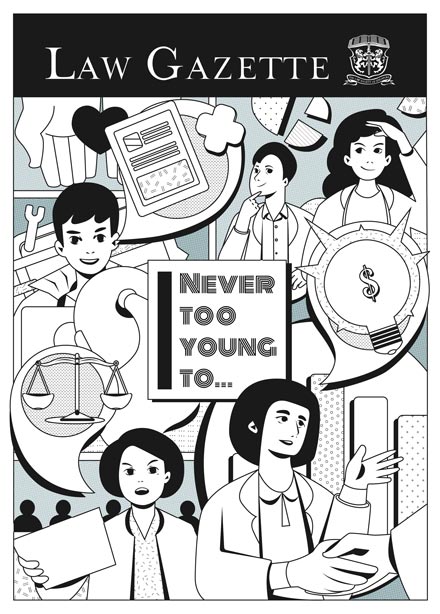
You Are Never Too Young to Lead
We have all exchanged a tale or two about bosses behaving badly. Or maybe some of you have had the misfortune of being on the receiving end of workplace abuse. Maybe these stories have made you think – What does it mean to be a good leader? How does one avoid becoming a bad boss?
In this month’s edition of the Law Gazette, we warmly welcome the new members of the Bar, most of whom will be joining the ranks at the Mass Call. We are, ourselves, young lawyers and recall fondly our own Mass Call in 2015. As a junior lawyer, the question of what it means to be a good leader may presently seem irrelevant to you. You may have more pressing immediate concerns, such as how to acquire core competencies or what to say at your first PTC. For most, the future seems uncertain as to whether you will stay in the profession in the long run, much less whether you will make partner and, if so, when.
However, you don’t need to be at partner or even senior associate level to be a good leader. Being a good leader means being a good team player, regardless of your perceived or imposed status in the team. Personally, we do not profess to be exemplary leaders ourselves but we do believe that learning to become a good leader starts early.
Know Thyself
“Knowing others is intelligence; knowing yourself is true wisdom. Mastering others is strength; Mastering yourself is true power.” – Lao Tzu
It starts with self-awareness. Knowing yourself – including your personality type, your working style and how you interact with others – is pivotal in helping you decide your leadership style and approach. There is no one-size-fits-all leadership style. For example, as regards personality, an outgoing sort may generally be personable and influential and a quieter personality may generally command respect with considered views.
Pick a leadership style that fits you best so that you can express yourself sincerely. There is no need to be assertive and confident all the time (unless you naturally are, of course). It may exhaust you – and those around you – if you are constantly trying to be someone you are not. You are more likely to foster trust and convey reliability if your team members perceive that you are genuine.
Be Proactive
In practice, files are usually managed in a team system. Depending on each firm’s or department’s structure, you are likely to work with at least one other lawyer and paralegals, support staff, trainees or interns. The importance of being a good team player cannot be over emphasised. But really, what does it mean to be a good team player?
In our experience, it means according respect to every component of the team and extending a hand whenever it is needed. While each person has a specific role to play within the team, strive to be proactive and willing to help others. If a teammate is struggling with a task, volunteering to help may present you with a learning opportunity and help the team collectively meet its deadline and goals. As clichéd as it sounds, a team is only as strong as the weakest link. It will also prevent situations in which you are “swooped in” to help only at the eleventh hour.
In our firms, there is heavy emphasis on mentorship and creating a nurturing environment. As beneficiaries of such ecosystems, we also have an obligation to pay it forward. Even if your law firm does not promote mentorship, we urge you to make that change.
Pick Your Role Models
Needless to say, critically observe lawyers more senior to you, including lead counsel and middle management, not only for their advocacy and client management skills, but also for how they manage their team.
It is easy to be courteous to your peers, clients, opposing counsel, the Court and superiors and treat them with respect but the strength of one’s character is evidenced from how they treat their subordinates. From the standpoint of junior lawyers ourselves, the most highly-regarded and well-respected leaders of the Bar are those who treat their associates, paralegals, support staff, trainees and interns well. Modelling after those who do will stand you in good stead in becoming a good leader yourself.
In your capacity as a junior lawyer, the same principles should apply to you in your treatment of your peers, support staff, trainees and interns. Small gestures count, such as taking the time to explain the facts of the file or even something as simple as making sure their meals are provided if they need to work overtime. In the event that expectations are not met, while constructive feedback is necessary for growth, there is no need to make demeaning remarks or personal attacks, publicly or privately.
Feedback is a Two-way Street
Feedback channels should be two-way so learn to communicate effectively. Ideally, you should find yourself in a position where feedback is forthcoming and your feedback to your superiors is also considered and valued. In giving instructions to your peers, support staff, trainees or interns, express clearly what needs to be done and by when.
A good leader assigns a reasonable timeline, trusts that the work will be done and does not micro-manage the process. Micro-managing may cause even more misunderstandings and anxiety and will not give your team members the room to grow. Practice is fast-paced and we face pressure from our clients, opposing counsel, the Court and other parties. Be that as it may, invest time to give clear instructions because it will improve workflow and, on the whole, increases efficiency. Where praise and recognition is due, be liberal with it.
Learn to receive feedback, not just from your superiors but also from your juniors or subordinates. Being receptive to feedback sounds straightforward in theory but is difficult in practice because criticism is not always palatable. It requires fighting the urge to rationalise oneself or to finger-point. In other words, it requires putting aside your pride.
Lead by Example
“Setting an example is not the main means of influencing others, it is the only means.” – Albert Einstein
We have all experienced our share of leaders who do not “walk the talk”. Leading by example is a crucial component of winning the trust of your team members. While few of us can say that we have “arrived”, there is no reason why we cannot set an example in our own ways to those around us.
While it can be difficult to model what you believe in when times get tough, doing so will help to inspire those around you to do the same. For instance, owning up to your (inevitable) mistakes shows integrity and encourages others to do likewise to adopt a problem-solving instead of a blame-pushing attitude. Treating your team members with respect promotes a healthy working relationship within the team.
We may be young, but it will be a pity if our youth gives others a reason to despise us. Showing others that we truly believe in what we say we believe in and setting an example is a powerful way of influencing those around us, no matter our seniority.
Conclusion
A profession is only as good as the people in it. The juniors and followers of today will end up being the leaders of tomorrow. While we can give thanks for the many good leaders who exist in this industry, it is for us to continue this by learning to lead well even as we start and grow in the profession. We wish all new members of the Bar the best as you plunge into a world where the challenges may be many, but the rewards will be sweet!

This article is part of the August 2018 Special Issue produced for the newly called lawyers of Mass Call 2018.






